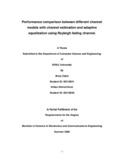Performance comparison between different channel models with channel estimation and adaptive equalization using Rayleigh fading channel
Abstract
This thesis project is a comparison between the performances of different
channel model with modulation, channel estimation, adaptive equalization for
both linear and non-linear equalizer and demodulation techniques using slow
Rayleigh fading channel with the target to reduce the fading effect for the multipath
wireless network and mobile communications. For channel models we have
used flat fading and frequency selective fading (FSF) channel. For the
comparison we have tested the effect of different channel models using different
conditions under QPSK (Quadrature Phase Shift Keying) modulation with
channel estimation, linear and non-linear equalization with Least Mean Squares
(LMS) algorithm. We have tested the effect of the channel models using the input
data and input image in receiver with BER (bit error rate) and SER (symbol error
rate) plots under QPSK modulation. We want to simulate the flat fading channel
and frequency selective fading channel in slow Rayleigh fading using a model
simulated to GSM (Global System for Mobile Communication) system. We have
used GSM carrier frequency and bandwidth and then compare mainly the
theoretical BER with the simulated BER through a model with the target to
reduce the fading effect of the wireless multi-path channel.
In the project we have used Matlab 7.0 for algorithms and simulations.

